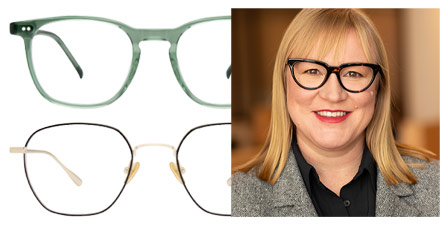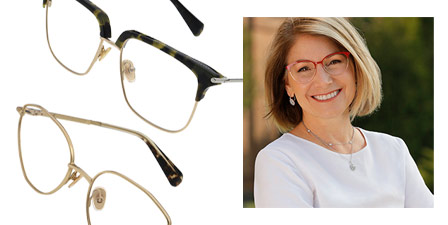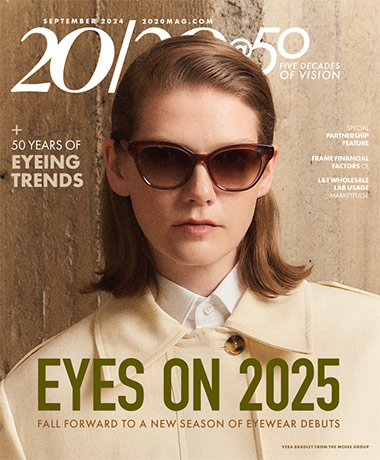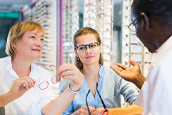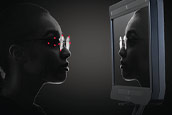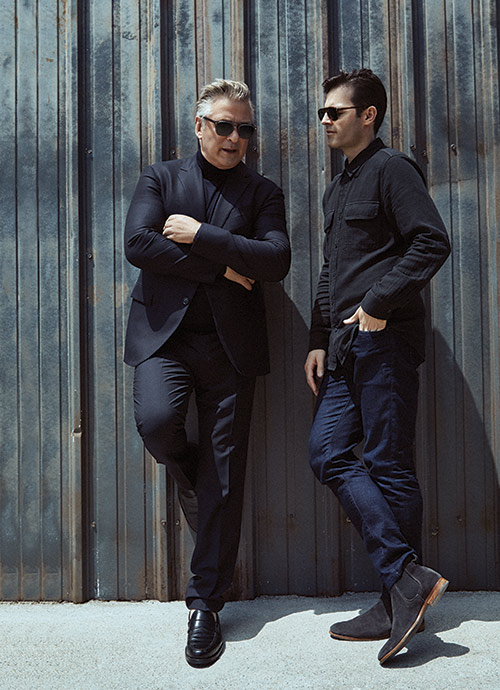
Photographed by Jennifer Massaux
This is new territory for 20/20. Sure, we’ve interviewed celebrities and actors about eyewear. And there’s been volumes of text via our deep past as eyewear press purveyors when it comes to chatting up eyewear designers, those fascinating Artists of the Frame. And 20/20 has long considered the “slash” joining the two “20s” in our brand name as representing a certain sense of style set with a swirl of cache.
But here we stand on a frontier-future of SPECulating with the renowned Alec Baldwin as he basically goes at it via answers AND questions with eyewear designer Ashley Bezamat on the occasion of being framed and fitted with Dom Vetro eyewear. Conceived and handcrafted right in Bezamat’s Los Angeles studio, Dom Vetro is set to establish frame standards of American-made eyewear in a manner and matter that is at once artisanal, classic and energetically futuristic. The whole optical arena is set for a super uptick in high profile, yet unique appreciation.
Rather than go too deep on details, please join 20/20 as we take an intimate listen to the rich-with-delight and very personal discussion between our cover host Alec Baldwin and his favorite eyewear designer… Ashley Bezamat.
–James J. Spina
ALEC: I want to begin by saying that I met you by seeing an article on Michael Fassbender... it was in what magazine?
ASHLEY: Esquire.
ALEC: Esquire. So Michael Fassbender (who you’d have to really, really be an idiot to make him look bad, he always looks good) is doing a layout, and he has all these beautiful clothes on, and he looks perfect—and he has these glasses on. And I remember saying to myself, as you know, “Man, what are those glasses?” I go nuts online, trying to find you and who you are, and what is Dom Vetro—and we finally connect. And you very graciously made beautiful glasses for me. I wasn’t aware that anyone was in the custom eyewear business. You make custom eyewear.
ASHLEY: I do. That’s my specialty.ALEC: In terms of tailor made or custom... anything to do with fashion and clothing, I’ve had every end of it. Meaning I would do a movie once, and they didn’t have any money, and there were a couple of leading ladies in the movie, and they spent all the money on their clothes—as it should be. And for the men in the show, the woman who is the wardrobe designer takes us into a room, and the room will look like a little closet, and all the clothes were from Land’s End or Banana Republic. They had to buy everything on the low; they didn’t have any money. And you could tell in her face that she was somewhat embarrassed. She brought me into the room with the clothing, and she literally went... [GESTURE] — like, “that’s it.” On the other end, I’ve had people custom make me tuxedos for $10,000...
ASHLEY: So what do you do for films? Do you have your glasses made for you?
ALEC: Well, glasses are different. Meaning no, you don’t have them made. I’ve had suits, ties, shirts... I mean, I’ve had clothes custom made by the greatest... Gieves and Hawkes, custom tuxes to do films. But never glasses.
ASHLEY: Did you know that my great-grandfather was the head tailor at Warner Brothers studio and did all the costumes for Frank Sinatra?
ALEC: I didn’t know that.
ASHLEY: Yeah, Italian American.
ALEC: Did you know that Michael Feinstein, the piano player and the singer, he bought vintage clothes from Jack Warner’s estate. He bought Jack Warner’s...
ASHLEY: So my grandfather made Jack Warner’s clothes.
ALEC: Michael Feinstein is wearing those clothes. I saw Michael Feinstein in a restaurant in New York, I go, “That’s the most amazing suit, and that fabric is so amazing,” whereupon he said, “I bought it from the Jack Warner estate.”
ASHLEY: My grandfather made those clothes.
ALEC: Describe to me, before you got involved in this and before you started doing... What were you doing?
ASHLEY: I went to Stanford.
ALEC: What did you study?
ASHLEY: Business. I worked in tech, and I needed a break and moved to Italy, and started learning Italian. I met some artisanal eyewear makers and started learning about their business and their process, and decided to move there—and bought a factory.
ALEC: Did you just say that you went to Italy and learned Italian to meet artisanal eyewear manufacturers?
ASHLEY: Yes.
ALEC: I would have learned Italian to do other things over in Italy, but that’s just me. I’m just saying. If I was young and handsome, I would have learned Italian, and I’d go to Italy to pursue other things. But go ahead, please, you carry on. You went over there to learn the eyewear business, the custom eyewear business.
ASHLEY: I did.
ALEC: Did you have a mentor?
ASHLEY: I did. I had two or three mentors.
ALEC: Give us a name.
ASHLEY: Luciano.
ALEC: He’s like Madonna. Luciano. In the eyewear business, he is Luciano.
ASHLEY: Exactly. He is like the head honcho guy.
ALEC: How did you meet him?
ASHLEY: I met him through some local artisanal eyewear people. They said, “You have to meet Luciano.”
ALEC: But what was it about this and manufacturing this custom product that appealed to you? But why? Why?
ASHLEY: So, it was really more of a personal journey for me, to just go in and have my own glasses made. The way I started the company was actually a documentary project. I filmed the artisans making the glasses, and I said, “Hey, let me help you figure out how to operate your business more efficiently,” and I spent some time with them. Then I bought 100 pairs of glasses and went back to New York. Ralph Lauren found out about my project, this documentary film that I was working on, and called me in and said, “Hey, are you interested in making glasses for Club Monaco?” So I basically started my eyewear career designing and making glasses for Club Monaco under Ralph Lauren, and it’s for that reason I moved to Italy and started making glasses.
In the beginning, I literally had 100 pairs of glasses sitting in my apartment. I had no idea what I was going to do with them. I didn’t know anything about design, craftsmanship, fashion, and I was just giving them to people and sharing a story about going to Italy and meeting these people and having this incredible, beautiful product. So where we are now is really me sharing that experience with people.
And the whole idea behind custom is letting your own personality come through and being a designer who is really kind of guiding you to your ideal style, to the perfect pair of glasses for you. So our tagline is really “Every pair is personal.” That’s because I don’t want to dictate to you what’s right.
ALEC: Where did the name come from?
ASHLEY: Dom Vetro means “House of Glass.” All the lenses were made of glass.
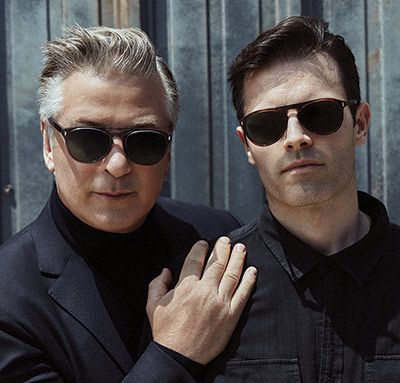
The Rafael from Dom Vetro on Alec; F-36 from Dom Vetro on Ashley
ALEC: Now for me, what I wear and what I don’t wear is somewhat neurosis inducing. Like, what I want to wear... I don’t like a lot of things. I don’t want to draw too much attention to myself. I don’t want to try to look young. For example, I don’t own any blue jeans. I never wear jeans, ever. I would have black jeans. I have black jeans from some companies that I really like. Then my wife, who is much younger than me, would sit there and say, “That’s so ’80s; black jeans are so ’80s.” She would really give it to me. She loves to give it to me, poke fun at me...
ASHLEY: I can make you some ’80s glasses to go with the black jeans.
ALEC: I’m so happy you said that. Because then I can wear my black jeans and feel like it’s all coming together. But my point is, I don’t own any blue jeans. There’s a lot of things I don’t wear. I don’t want to be a guy of my age who is straining to look young—baseball caps and all that kind of thing. No offense to anybody who wears baseball caps.
But I do like classic, and what I loved about those glasses I saw, the sunglasses that Fassbender had, is that they were so classic; they were so beautiful. Now for me, I have a wide head, and my hat size is 7-3/4. I’ve got a really fat head. So I’ve got to be very careful that I wear a nice wide frame. So when you made me the custom frames... That’s the thing that I think is perfect with what you do. That’s the essential benefit of buying the product you make, is that you can go into a store, and you can see a style you like. I’m constantly going into stores. I was in Balenciaga the other day, and there is a pair of sunglasses that I love, but they weren’t wide enough. I see the style I like, but it doesn’t fit me. So when you fit them to custom, and they’re perfect—it works.
ASHLEY: Right. It doesn’t get better.
ALEC: Any.
ASHLEY: Pretty much, yeah. I’m actually glad you reached out again, because when we talked the first time, the glasses were too small, and you asked me if I could make them bigger.
ALEC: I told you how fat my head was but you didn’t believe it.
Now, who is someone in this world of fashion... Obviously, there are people who come to mind who are very stylish in terms of their eyewear—Elton John is legendary, blah-blah-blah. Who is someone that you’re dying for them to call you? You want to dress them, so to speak, in eyewear? Who is one of your dream clients?
ASHLEY: I would say Bradley Cooper.
ALEC: Bradley Cooper.
ASHLEY: Yeah. Bradley Cooper.
ALEC: What about for women? Are you more geared to one than the other?
ASHLEY: I’m more geared toward men, but we do have a new women’s collection that we’re launching. I actually sent Hilaria (Alec’s wife) one of the first samples that we made, the CatEye.
ALEC: And she wears them.
ASHLEY: She does.
ALEC: She does wear them, yes. She’s crazy about them. My wife is now at that place where people send her more free stuff than they send me. I get nothing any more.
ASHLEY: How does that feel?
ALEC: I’m sad. I miss the old days.
ASHLEY: Well, I really appreciate that you really insist to pay for our product. That means a lot.
ALEC: Yes. But isn’t it interesting how people will constantly send you things, people are constantly sending me things, and they’ll say, “But you can have this,” and I’ll think to myself... I mean, not all the time, but I’ll sit there and think, “Whoa, how nice of you that it’s free, because I wouldn’t necessarily buy this myself.” But if someone sends me something that I would ordinarily have bought... Your glasses are worth it.
ASHLEY: Thank you, Alec.
ALEC: When you sent them to me, and I wanted to pay for them—I always want to pay for things that’s worth it. I don’t know how many pairs you’ve sent me now, so far 80 to 90 pairs of glasses you’ve sent my family now...
ASHLEY: About 100.
ALEC: About 100. All of them are perfect, and all of them look great on my kids, on my daughter Carmen, who wears a prescription because she has a lazy eye, and my wife, of course, is a sunglass fanatic.
Two things. The people that I always loved in the world of fashion... When I first started making films, everybody was Armani crazy. That was in the beginning, when Armani had... Wanda McDaniel was her name. She was a famous marketing person for Armani. Wanda McDaniel was legendary, because she’s the one who got Armani on the screen. Richard Gere in “American Gigolo”... She took Armani into that world of the super-ubiquitous, you know, men in those suits, Michael Douglas and all your great leading men wearing Armani. Wanda McDaniel repped Armani here in New York. I remember Armani; what I loved—you could tell the fabrics were just impeccable. You had different weights. You had a heavy weight for the fall. You had these medium weights, you had light weights. They had the most beautiful dyes. Canali… Zegna, of course, was one of my favorites, my absolute favorite. But all of them... Anything I buy, what I like is you can tell that people cared. You can tell that people cared.
ASHLEY: Right.
ALEC: Of course, if they can afford to care. Some companies, they really can’t afford to care too much because it costs too much money. But my point is that even some companies, I’m surprised by some companies who, the price point isn’t that high, but they still care. J.Crew has really beautiful dyes in some of their fabrics.
ASHLEY: They do. Beautiful cashmere, too.
ALEC: They really do. J.Crew has some really, really beautiful things as well. But you can tell—the moment you sent me these, or the moment I saw them in the picture... But I don’t buy anything online. I don’t buy anything from a photograph. I met you through that path and then you sent them to me... The moment I saw them I thought to myself, “These are some of the most beautiful eyeglasses I’ve ever seen in my life,” and I have a couple of them. So there you have it.
ASHLEY: Thank you. May I ask you a question?
ALEC: Go ahead.
ASHLEY: Just about you and your career… What has been your mantra over the years? What is your north star that has gotten you here?
ALEC: Well, I think that in my business, there’s a lot of people trying to manage their career, manipulate their publicity, the public, the business itself that hires you... In my business, you have two types of people you’re trying to win the approval of—the people who hire you and the people who buy the tickets. So there’s the studio executives, the production heads, the casting people, and then there’s the ticket-buying public. And it’s very stressful to try to figure out a way to seduce or win over both those people. For me, I think that the constant is “don’t be afraid to try anything.” If I had done things in a certain way, where I was more cautious, and I tried to stay in a certain zone, and I tried to find something I did as an actor that worked and just replicate that over and over again—that’s one way to go, and some people have had enormous success doing that.
For me, I’ve had people come to me and say, “Do you want to do this?” and there’s a part of me that would say, “Well, that sounds like a really stupid idea,” and then I’d do it, and when I did “30 Rock,” that’s the best example of something where they came to me and I said, “Oh, I don’t want to do that; I don’t want to do a TV comedy and sign on for all those years and do that.” And when it was over, I cried. I was so sad when it was over. It was one of the best jobs I’ve ever had.
I think the thing that you and I have in common is... You have to try... When I make a movie or I do a job, I say to myself, “How can I be the best thing in the movie?” even if I don’t have a big part. And for you, I have abundant faith in you that you’re going to “make it,” but the only way you’re going to make it is to stick with your instincts. Don’t ever let anybody talk you out of your instincts. That’s the mantra. Meaning, your instincts told you to go to Italy and go meet Fabrizio, was his name...
ASHLEY: Luciano.
ALEC: Luciano. I’m sorry. My apologies, Luciano. I’m sorry. Luciano. You went to Luciano, and you began this path. And that is, don’t ever stop doing what you’re doing. You relied on yourself, you relied on your instincts—don’t stop doing that. That’s what’s going to give you the abundant success that you deserve, I think.
ASHLEY: I’ll remember that.
ALEC: You owe me $50,000 in consultation fees. There we go. We’re good?
ASHLEY: We’re good! ■
WE HAVE ALL BEEN HERE BEFORE IN 20/20:
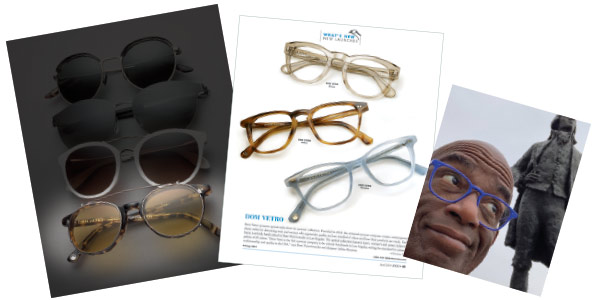
The sun-clipped Dom Vetro style Capretta shows up with intense detail in the March 20/20 style feature predicting hot eyewear for the year 2020. The buzz on Ashley Bezamat ramped up intensely since this was an Expo East issue with greatly expanded showgoer retailer exposure.
The Dom Vetro collection makes its What’s New debut in the very next April 20/20 issue. And the story continues with a feature in the May 20/20 Upfront section as the Dom Vetro designer gains nationwide exposure custom fitting Today show’s Al Roker in electric blue-hued style Arthur. Roker noted exclusively to 20/20’s Executive Editor Christine Yeh that, “I like bright colors, and I’ve used them for accents—for a pocket square, my tie, a shirt, so why wouldn’t you do it with your glasses?”
—JJS



